 W
WThe Academic Symphony Orchestra of the Lviv National Philharmonic is one of the oldest symphony orchestras in Ukraine.
 W
WThe State Anthem of the Ukrainian SSR was the Soviet republican anthem of the Ukrainian Soviet Socialist Republic when it was one of the republics of the Soviet Union.
 W
WA bandura is a Ukrainian, plucked string, folk instrument. It combines elements of the zither and lute and, up until the 1940s, was also often referred to by the term kobza. Early instruments had 5 to 12 strings and similar to the lute. In the 20th century, the number of strings increased initially to 31 strings (1926), then to 56 strings - 68 strings on modern 'concert' instruments (1954).
 W
WBe Free was a Belarusian rock festival that took place in Ukraine since 2007. Bands from Poland, Ukraine, and France participated in the festival too.
 W
WThe Canadian Bandurist Capella is a vocal-instrumental ensemble that combines the sounds of male choral singing with the orchestral accompaniment of the multi-stringed Ukrainian bandura. Originally established as "Toronto Bandurist Capella" in 2001, the ensemble has been performing under the name "Canadian Bandurist Capella" since 2004. It is based in Toronto, Ontario, Canada.
 W
WA Duma is an epic sung epic poem which originated in Ukraine during the Hetmanate Era in the Sixteenth century. Historically, dumy were performed by itinerant Cossack bards called kobzari, who accompanied themselves on a kobza or a torban, but after the abolition of Hetmanate by the Empress Catherine of Russia the epic singing became the domain of blind itinerant musicians who retained the kobzar appellation and accompanied their singing by playing a bandura or a relya/lira. Dumas are sung in recitative, in the so-called "duma mode", a variety of the Dorian mode with a raised fourth degree.
 W
WHymn of Crimea is the official anthem of the Crimea. The anthem was composed by Alemdar Karamanov, and the text was written by Olga Golubeva.
 W
WA Kobzar was an itinerant Ukrainian bard who sang to his own accompaniment, played on a multistringed bandura or kobza.
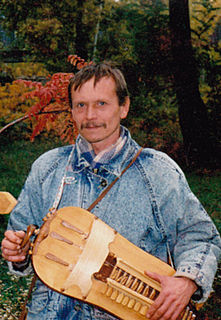 W
WThe lira, or relia, is a Ukrainian variant of the hurdy-gurdy, an instrument which can trace its history back to the 10th century. Regarding the origins of the lira in the region there are two schools of thought:The lira is an evolution of the medieval bowed lira of the Byzantine Empire, ancestor of most European bowed instruments. The Byzantine lira was possibly introduced into Ukraine through the various trade routes to Byzantium. The lira was introduced into Ukraine in the 17th century by Cossacks who had fought in France as mercenary soldiers.
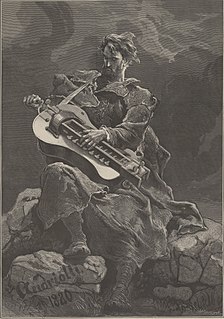 W
WThe lirnyk were itinerant Ukrainian musicians who performed religious, historical and epic songs to the accompaniment of a lira, the Ukrainian version of the hurdy-gurdy.
 W
WLviv National Musical Academy named after Mykola Lysenko or informally Lviv Conservatory is a state conservatory located in Lviv (Ukraine).
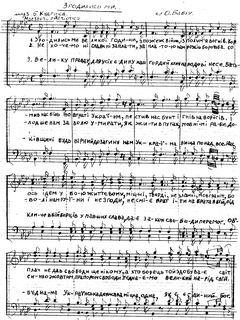 W
WThe March of Ukrainian Nationalists is a Ukrainian patriotic song that was originally the official anthem of the Organization of Ukrainian Nationalists and the Ukrainian Insurgent Army. The song is also known by its first line "We were born in a great hour". The song, written by Oles Babiy to music by Omelian Nyzhankivskyi in 1929, was officially adopted by the leadership of the Organization of Ukrainian Nationalists in 1932. The song is often referred to as a patriotic song from the times of the uprising, and a Ukrainian folk song. It is still commonly performed today, especially at events honoring the Ukrainian Insurgent Army and by nationalist organizations and party meetings, such as those of VO Svoboda.
 W
WVivienne Mort is a Ukrainian indie rock band formed by Daniela Zaiushkina in 2007.
 W
WNatalka Poltavka is a Ukrainian play written by Ivan Kotlyarevsky.
 W
W"Shche ne Vmerla Ukrainy i slava, i volia", also known by its official title of "State Anthem of Ukraine" or by its shortened form "Shche ne vmerla Ukrainy", is the national anthem of Ukraine. Its music was officially adopted by Ukraine's Verkhovna Rada on 15 January 1992. The official lyrics were adopted on 6 March 2003 by the Law on the Anthem of Ukraine.
 W
WThe Kyiv Opera group was formally established in the summer of 1867, and is the third oldest in Ukraine, after Odessa Opera and Lviv Opera. Today, the Kyiv Opera Company performs at the National Opera House of Ukraine named after Taras Shevchenko in Kyiv.
 W
WThe National Union of Composers of Ukraine is a public organization that unites Ukrainian composers and musicologists working in academic music. Potential members must have completed a full course of higher education and produced a significant body of work.
 W
WThe idea of the preservation of kobzar music by means of sound recording originated in 1901–02. Kobzars were itinerant Ukrainian folk musicians who sung dumas and folk songs to their own accompaniment of kobza, bandura or lira.
 W
WUkrainian rock is rock music from Ukraine.
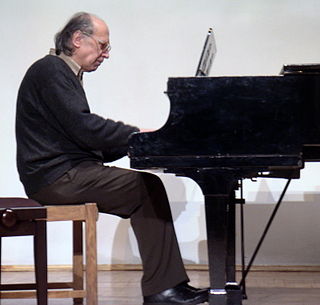 W
WValentyn Vasylyovych Silvestrov is a Ukrainian composer and pianist of contemporary classical music.
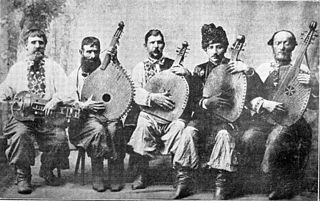 W
WThe kobzari of the Slobozhan bandura tradition were kobzari who lived in the Slobozhan region around the city of Kharkiv, Ukraine. They include Petro Drevchenko, Pavlo Hashchenko, Hnat Honcharenko, Horobetz, F. Hrytsenko-Kholodny, Hryhory Kozhushko, Ivan Kuchuhura Kucherenko, Ivan Netesa, Odnorih, Stepan Pasiuha, Mykola Ryhorenko and P. Trotchenko.
 W
WUkraine were one of the twenty-four participating countries and regions competing in the first Turkvision that took place between 17 and 21 December 2013.
 W
WUkraine has participated in the Eurovision Song Contest 16 times since making its debut in 2003. Ukraine has won the contest twice: in 2004 with "Wild Dances" by Ruslana, and in 2016 with the song "1944" by Jamala, thus becoming the first Eastern European country to win the contest twice. Ukraine hosted the 2005 and 2017 contests in Kyiv.
 W
WUkraine has participated twice in the Eurovision Young Musicians since its debut in 2008, most recently taking part in 2012.
 W
WUkraine took part in the Junior Eurovision Song Contest for the first time in 2006. Their best result came in Junior Eurovision Song Contest 2012 when Anastasiya Petryk won for Ukraine with "Nebo". Her sister Viktoria Petryk came 2nd at the Junior Eurovision Song Contest 2008 with "Matrosy".
 W
WThe participation of Ukraine in the Bala Turkvision Song Contest first began in Istanbul, Turkey, at the inaugural Bala Turkvision Song Contest in 2015. Odessa ODTRK (OODTRK) have been responsible for the selection process of their participants, since their debut in 2015. Albina Kazanzhi was the first representative for Ukraine at the Bala Turkvision Song Contest 2015 with the song "Dostluk", which finished in fifth place out of thirteen participating entries, achieving a score of one-hundred and five points. As of Bala Turkvision 2015, Ukraine have awarded the most points to Azerbaijan, Gagauzia, Kazakhstan, and Kyrgyzstan. They have received the most points from Găgăuzia, Georgia, Kazakhstan, and Kyrgyzstan.
 W
WZnamenny Chant is a singing tradition used by some in the Russian Orthodox Church. Znamenny Chant is unison, melismatic liturgical singing that has its own specific notation, called the stolp notation. The symbols used in the stolp notation are called kryuki or znamena. Often the names of the signs are used to refer to the stolp notation. Znamenny melodies are part of a system, consisting of Eight Tones ; the melodies are characterized by fluency and well-balancedness. There exist several types of Znamenny Chant: the so-called Stolpovoy, Malyj (Little) and Bolshoy (Great) Znamenny Chant. Ruthenian Chant (Prostopinije) is sometimes considered a sub-division of the Znamenny Chant tradition, with the Muscovite Chant being the second branch of the same musical continuum.